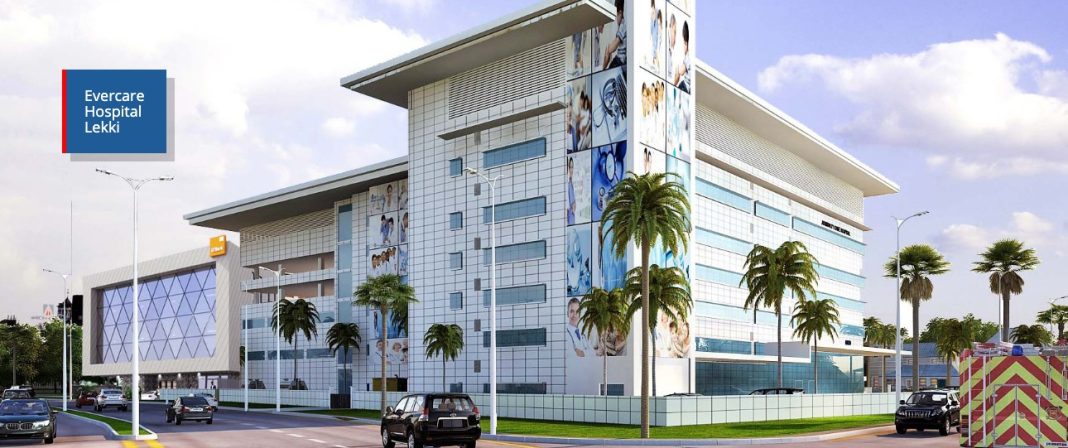Global awareness of climate change and the importance of sustainability as a strategic mitigant is transforming industries. This includes healthcare delivery, which in many countries worldwide is witnessing a gradual but steady evolution towards environmental resilience. This transformation to sustainability is helping hospitals enhance the quality of healthcare delivery, optimise business results, and save the planet.
Research showed that hospitals are the second most energy-intensive buildings. They operate 24/7 and consume 2.5 times the energy of a comparable commercial property. Incorporating sustainability practices in hospitals’ design, construction, and operations help owners realize significant operational savings by reducing energy and water consumption. Eco-efficient solutions create well-ventilated hospital spaces and foster a nurturing environment that enhances patient care.
Evercare Hospital Lekki is leading a shift towards sustainable medical care to stay ahead of the curve in Nigeria’s healthcare industry. Located in Lagos, Nigeria’s economic nerve center, the 165-bed multispecialty tertiary care facility has resource efficiency in its design and operations.
Evercare CEO, Rajeev Bhandari, who has a track record of identifying and creating business opportunities to grow market share, noted that sustainability is a key part of the hospital’s overall business strategy. “This is because we understand sustainability’s important role in boosting healthcare delivery, protecting the ecosystem, and preserving natural resources for future generations.” says Rajeev Bhandari.
“We aim to ensure optimal outcomes for our patients by preventing care-related incidents and infections while providing safe care and appropriate medical management. Our patients are happy to know that our environment is green and eco-friendly, which means that there are no adverse effects on their health within our environment. They are assured of our hygienic cooling air system, which ensures no cross-infection in the air circulation within the hospital.”
Evercare Hospital Lekki was commissioned by Vice President Yemi Osinbajo and commenced operations in March 2021, offering high-quality and accessible healthcare across a range of specialty medical and surgical services to communities. The hospital is part of the Evercare Group.
The international investment Group is wholly owned by the Evercare Health Fund, a US $1bn emerging markets healthcare fund managed by The Rise Fund, the impact investment platform of global alternative asset manager TPG Capital. The Group comprises the world’s leading development finance institutions, including IFC and other impact investors such as the Melinda Gates Foundation and the Nigeria Sovereign Investment Authority (NSIA).
Leveraging the EDGE Hospital Advantage
To realize its sustainability objectives, Evercare Hospital leveraged the many benefits of EDGE to engineer a facility that provides the highest healthcare standards without wasting resources.
EDGE (Excellence in Design for Greater Efficiencies) is an innovation of the International Finance Corporation (IFC), a member of the World Bank Group. It is powered by free software that empowers property developers to deliver resource-efficient buildings in a fast, easy, and affordable way. EDGE is a key part of IFC’s efforts to lead a sustainable future by encouraging construction developers worldwide to build a safer climate and is currently in use in over 140 countries.
Evercare made the right decision to incorporate EDGE in the hospital’s structural design and construction due to the software’s tight focus on energy, water and embodied energy in materials and the credibility of the World Bank Group’s name. The free EDGE software enabled Evercare to evaluate their designs, increasing their confidence in obtaining certification.
In May 2022, Evercare Hospital Lekki made history as the first hospital in Nigeria to receive Final EDGE Certification as a resource-efficient and environmentally friendly building healthcare project. Sintali-SGS, an environmental certification body and global certification partner for IFC’s EDGE green building program, established that Evercare Hospital achieved a 38.81 percent reduction in energy usage, 20.50 percent in water consumption, and 42.07 percent in materials’ embodied energy compared to a local benchmark.
Bhandari further noted that sustainable design bolstered Evercare Hospital’s ability to price right in a highly competitive market.
“Increased energy efficiency gives Evercare high savings on operational costs, which contributes to the highly competitive pricing that we offer to our customers. As a result, our hospital is more accessible to a wider spectrum of income earners,” Bhandari said, adding, “In addition, even though we spent a little more to achieve sustainability, it was on the conviction that building green saves a lot of money over time. I am proud to note that in our 15 months of operations, we have saved 28 percent in energy costs. This makes up for the initial additional sustainability Capex. Indeed, we are pleased to have taken this decision “.
Eco-efficient technologies at Evercare Hospital Lekki include solar photovoltaics handling a significant portion of power needs, energy-efficient lighting, and intelligent air conditioning systems. The hospital uses LED light fittings, and light in critical parts of the facility is timer controlled. Instead of re-circulating the hospital air, the hospital’s cooling system takes fresh air from the outside, treats, and distributes it to different cooling units.
The hospital also deployed insulated roofing sheets, double-glazed glasses, and aluminum sheets to reduce the sun’s rays and wall-to-window ratio, improve efficient material usage. Other features include low-flow plumbing fittings for wash hand basins, kitchen faucets, taps, and a wastewater treatment plant to optimize water usage.
Evercare’s fine fusion of sustainability and advanced medical care should inspire other players in Nigeria’s healthcare industry to join the global transition to eco-friendly hospitals that care for patients and the planet. The hospital’s savings from operational costs due to energy and water savings, an improved environment that enhances patient recovery and satisfaction, and employee productivity are also good business takeaways. They prove the business case for sustainable healthcare delivery in helping hospital owners achieve the corporate social responsibility of caring for the environment and the planet.
Terhemen Mark is a housing policy analyst based in Abuja
Email: mchieshe@gmail.com

































